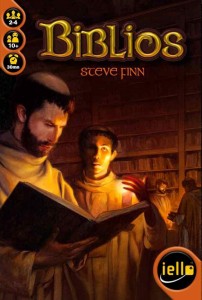Review: Biblios
Posted by James (admin) on May 12th, 2011
 In Biblios, players are monks trying to make the best library and the player with the most victory points (VPs) at the end of the game wins. Biblios is a card game with some similarities to For Sale (as players spend the first game phase gaining cards and the second phase using those cards to get better cards) which already gives it a good start in my eyes.
In Biblios, players are monks trying to make the best library and the player with the most victory points (VPs) at the end of the game wins. Biblios is a card game with some similarities to For Sale (as players spend the first game phase gaining cards and the second phase using those cards to get better cards) which already gives it a good start in my eyes.
During the game, players gain cards of 3 different types: coloured cards (which have values on them), dice cards and gold cards. At the end of the game, the player with the highest total value of cards in each of the 5 colours scores VPs equal to that colour’s value (between 1-6 VP). However, the VP value of each colour (shown on coloured dice on the board) can change during the game because players that gain dice cards can alter 1 or 2 dice values up or down 1 or 2 points each depending upon the card.
In the first game phase, players gain cards. Players take turns drawing and allocating a number of cards equal to the number of players plus one. The player can place 1 card in the auction pile, 1 card in their own hand, and the rest in the common area. However, the interesting part is that the active player draws cards one-by-one so they must allocate each card before knowing what the next card is. Once allocated, the other players each take 1 card from the common area, so all players each add 1 card to their hand each round and the active player has some control over what is available.
 Once all the cards have been allocated, the game enters the auction phase where the cards that have accumulated in the auction pile are auctioned off one-by-one. Players bid gold cards to purchase coloured cards and they bid numbers of cards (their values are irrelevant) to purchase gold cards. When all cards have been auctioned, players reveal their totals for each colour and allocate the VPs.
Once all the cards have been allocated, the game enters the auction phase where the cards that have accumulated in the auction pile are auctioned off one-by-one. Players bid gold cards to purchase coloured cards and they bid numbers of cards (their values are irrelevant) to purchase gold cards. When all cards have been auctioned, players reveal their totals for each colour and allocate the VPs.
Overall, I really liked Biblios because of the simple, yet often very tricky, choices. When allocating cards, working out what cards you should take for yourself, put in the auction pile and allow the other players to take can be very tricky indeed. You need to resist the temptation (which I failed to do) to try to build a high-scoring hand hand in the first phase and, instead, get cards which you can leverage in the auction phase.
During the second phase, the player’s hand can constantly shift (depending upon what the bid and win) and this is where the real thinking and tactical play comes into action. Players that can work out how to sacrifice cards in an auction to gain cards which they can then use for greater effect in further auctions are the ones likely to win as they keep increasing the strength of their hand. I made a major error and ended up with no cards left to bid with (as I wanted to keep all the blue and brown cards in my hand) so I was a bit stuck (and was a major factor in why I lost).
Biblios moves quickly and, as players are constantly involved, there is no downtime. Also, there is good interaction (mainly in the second phase) and plenty of opportunities/temptations to deny other players the cards they may want (or use against you, i.e. you may want to win a dice card purely to deny another playing using it to reduce the VP values of the colours they’ve noticed you’re collecting).
The dice on the board are an easy way to track each colour’s VP values and make the game feel slightly bigger than a card game, although the game could have been produced without them (using an indicator on the board or using cards to track colours’ values).
Biblios is yet another game in the recent releases that consists of a simple but compelling and interesting game mechanic and with no extra game systems around it which means it delivers a fast and pure game that still has meat. It could be played as a filler or as a short but main game. I’m liking this current trend of games as it allows me to pack in lots of great focussed game experiences. It’ll be interesting to see how it plays with 2 players as there’s more opportunity to remember what cards the other player has taken.
James.
[Played with 4 players]

